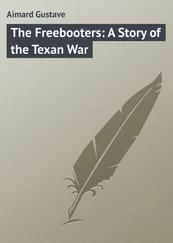Gustave Aimard - The Border Rifles - A Tale of the Texan War
Здесь есть возможность читать онлайн «Gustave Aimard - The Border Rifles - A Tale of the Texan War» — ознакомительный отрывок электронной книги совершенно бесплатно, а после прочтения отрывка купить полную версию. В некоторых случаях можно слушать аудио, скачать через торрент в формате fb2 и присутствует краткое содержание. Жанр: foreign_prose, foreign_adventure, foreign_language, на английском языке. Описание произведения, (предисловие) а так же отзывы посетителей доступны на портале библиотеки ЛибКат.
- Название:The Border Rifles: A Tale of the Texan War
- Автор:
- Жанр:
- Год:неизвестен
- ISBN:нет данных
- Рейтинг книги:5 / 5. Голосов: 1
-
Избранное:Добавить в избранное
- Отзывы:
-
Ваша оценка:
- 100
- 1
- 2
- 3
- 4
- 5
The Border Rifles: A Tale of the Texan War: краткое содержание, описание и аннотация
Предлагаем к чтению аннотацию, описание, краткое содержание или предисловие (зависит от того, что написал сам автор книги «The Border Rifles: A Tale of the Texan War»). Если вы не нашли необходимую информацию о книге — напишите в комментариях, мы постараемся отыскать её.
The Border Rifles: A Tale of the Texan War — читать онлайн ознакомительный отрывок
Ниже представлен текст книги, разбитый по страницам. Система сохранения места последней прочитанной страницы, позволяет с удобством читать онлайн бесплатно книгу «The Border Rifles: A Tale of the Texan War», без необходимости каждый раз заново искать на чём Вы остановились. Поставьте закладку, и сможете в любой момент перейти на страницу, на которой закончили чтение.
Интервал:
Закладка:
Captain Watt, who had been married for two years past to a charming young lady he adored, was father of two children, a son and daughter.
His wife, Fanny by name, was a distant relation of his. She was a brunette, with exquisite blue eyes, and was most gentle and modest. Although much younger than her husband, for she was not yet two-and-twenty, Fanny felt for him the deepest and sincerest affection.
When the old soldier found himself a father, and began to experience the intimate joys of a family life, a revolution was effected in him; he suddenly took a disgust to his profession, and only desired the tranquil joys of home.
James Watt was one of those men with whom it is only one step from the conception to the execution of a plan. Hence, no sooner had the idea of retiring from the service occurred to him than he at once carried it out, resisting all the objections and remonstrances his friends raised.
Still, although the Captain was inclined to retire into private life, he did not mean to put off military harness and assume a citizen's coat. The monotonous life of Union towns had nothing very seductive for an old soldier, for whom excitement and movement had been the normal condition almost from his birth.
Consequently, after ripe reflection, he stopped half way, which, in his opinion, would remedy the excessive simplicity and peace a citizen life might have for him.
This was to be effected by asking for a claim on the Indian border, clearing it with the help of his servants, and living there happy and busy, like a mediæval lord among his vassals.
This idea pleased the Captain the more, because he fancied that in this way he should still be serving his country, as he would lay the foundation of future prosperity, and develop the first traces of civilization in a district still given up to all the horrors of barbarity.
The Captain had long been engaged with his company in defending the frontier of the Union against the incessant depredations of the Redskins, and preventing their incursions; hence he had a knowledge – superficial it is true, but sufficient – of Indian manners, and the means he must employ not to be disturbed by these restless neighbours.
During the course of the numerous expeditions which the service had compelled him to make, the Captain had visited many fertile valleys, and many territories, the appearance of which had pleased him; but there was one above all, the memory of which had been obstinately engraved on his mind – a delicious valley he had seen one day as in a dream, after a hunting expedition, made in company of a wood-ranger – an excursion which lasted three weeks, and had insensibly taken him further into the desert than ever civilized man had gone before.
Though he had not seen this valley again for more than twenty years, he remembered it as if he had seen it but yesterday – recalling it, as it were, in its minutest details. And this obstinacy of his memory in constantly bringing before him this nook of earth, had ended by affecting the Captain's imagination to such a degree, that when he resolved to leave the service and ask for a claim, it was to this place and no other that he was determined to go.
James Watt had numerous friends in the offices of the Presidency; besides, the services of his father and himself spoke loudly in his favour: hence he experienced no difficulty in obtaining the claim he requested.
Several plans were shewn him, drawn up by order of government, and he was invited to select the territory that suited him best.
But the Captain had chosen the one he wanted long before; he rejected the plans shewn him, produced from his pocket a wide slip of tanned elk hide, unrolled it, and shewed it to the Commissioner of Claims, telling him he wanted this, and no other.
The Commissioner was a friend of the Captain, and could not refrain from a start of terror on hearing his request.
This claim was situated in the heart of the Indian territory, more than four hundred miles from the American border. The Captain wished to commit an act of madness, of suicide; it would be impossible for him to hold his ground among the warlike tribes that would surround him on all sides; a month would not elapse ere he would be piteously massacred, as must be his family and those servants who were mad enough to follow him.
To all these objections, which his friend piled up one atop of the other, in order to make him change his opinion, the Captain only replied by a shake of the head, accompanied by a smile, which proved that his mind was irrevocably made up.
At length, the Commissioner being driven into his last intrenchments, told him point-blank that it was impossible to grant him this claim, as the territory belonged to the Indians, and, moreover, a tribe had built its village there since time immemorial.
The Commissioner had kept this argument to the last, feeling convinced that the Captain could find no answer, and would be compelled to change, or, at least, modify his plans.
He was mistaken; the worthy Commissioner was not so well acquainted with his friend's character as he might fancy.
The latter, not at all affected by the triumphant gesture with which the Commissioner concluded his speech, coolly drew from another pocket a second slip of tanned deer-hide, which he handed his friend, without saying a word.
The latter took it with an inquiring glance, but the Captain merely nodded to him to look at it.
The Commissioner unrolled it with marked hesitation; from the old soldier's behaviour he suspected that this document contained a peremptory answer.
In fact, he had scarce looked at it, ere he threw it on the table with a violent movement of ill humour.
This slip of deer-skin contained the sale of the valley and the surrounding territory made by Itsichaichè or Monkey-face, one of the principal sachems of the Snake Pawnees, in his name and that of the other chiefs of the nation, in exchange for fifty muskets, fourteen dozen scalping-knives, sixty pounds of gunpowder, sixty pounds of bullets, two barrels of whisky, and twenty-three complete militia uniforms.
Each of the chiefs had placed his hieroglyphic at the foot of the deed, beneath that of Monkey-face.
We will say at once that this deed was false, and the Captain in the affair was the perfect dupe of Monkey-face.
This chief, who had been expelled from the tribe of Snake Pawnees for various causes, as we shall reveal at the proper moment, had forged the deed, first to rob the Captain, and next to avenge himself on his countrymen; for he knew perfectly well that if the Captain received authority from his government he would seize the valley, whatever the consequences of this spoliation might be. The only condition the Captain made was, that the Redskin should act as his guide, which he consented to do without any hesitation.
When the deed of sale was laid before him, the Commissioner was forced to confess himself beaten, and nolens volens grant the authority so obstinately solicited by the Captain.
When all the documents were duly registered, signed, and sealed, the Captain began his preparations for departure without further delay.
Mrs. Watts loved her husband too well to offer any objections to the execution of his plans. Brought up herself on a clearing at no great distance from the Indian border, she had become familiarized with the savages, whom the habit of constantly seeing caused her no longer to fear them; besides, she cared little where she lived, so long as she had her husband by her side.
Quite calm as regarded his wife, the Captain therefore set to work with all that feverish activity which distinguished him.
America is a land of prodigies; it is, perhaps, the only country in the world where it is possible to find between to-day and the morrow the men and things indispensable for carrying out the maddest and most eccentric projects.
Читать дальшеИнтервал:
Закладка:
Похожие книги на «The Border Rifles: A Tale of the Texan War»
Представляем Вашему вниманию похожие книги на «The Border Rifles: A Tale of the Texan War» списком для выбора. Мы отобрали схожую по названию и смыслу литературу в надежде предоставить читателям больше вариантов отыскать новые, интересные, ещё непрочитанные произведения.
Обсуждение, отзывы о книге «The Border Rifles: A Tale of the Texan War» и просто собственные мнения читателей. Оставьте ваши комментарии, напишите, что Вы думаете о произведении, его смысле или главных героях. Укажите что конкретно понравилось, а что нет, и почему Вы так считаете.












